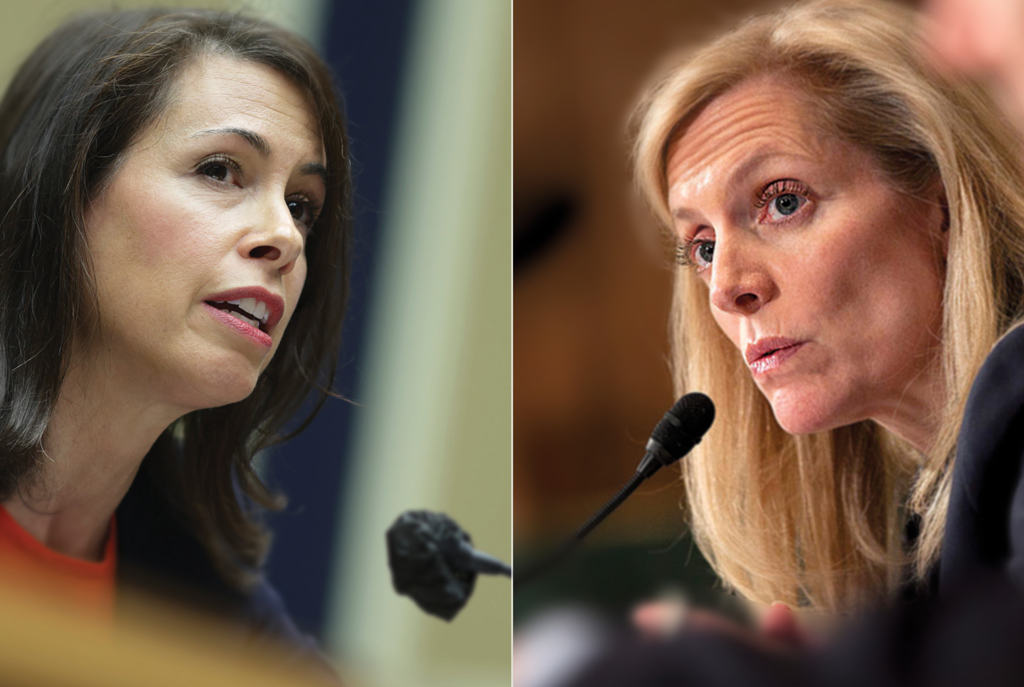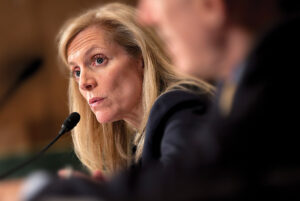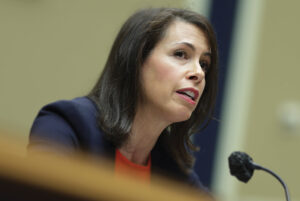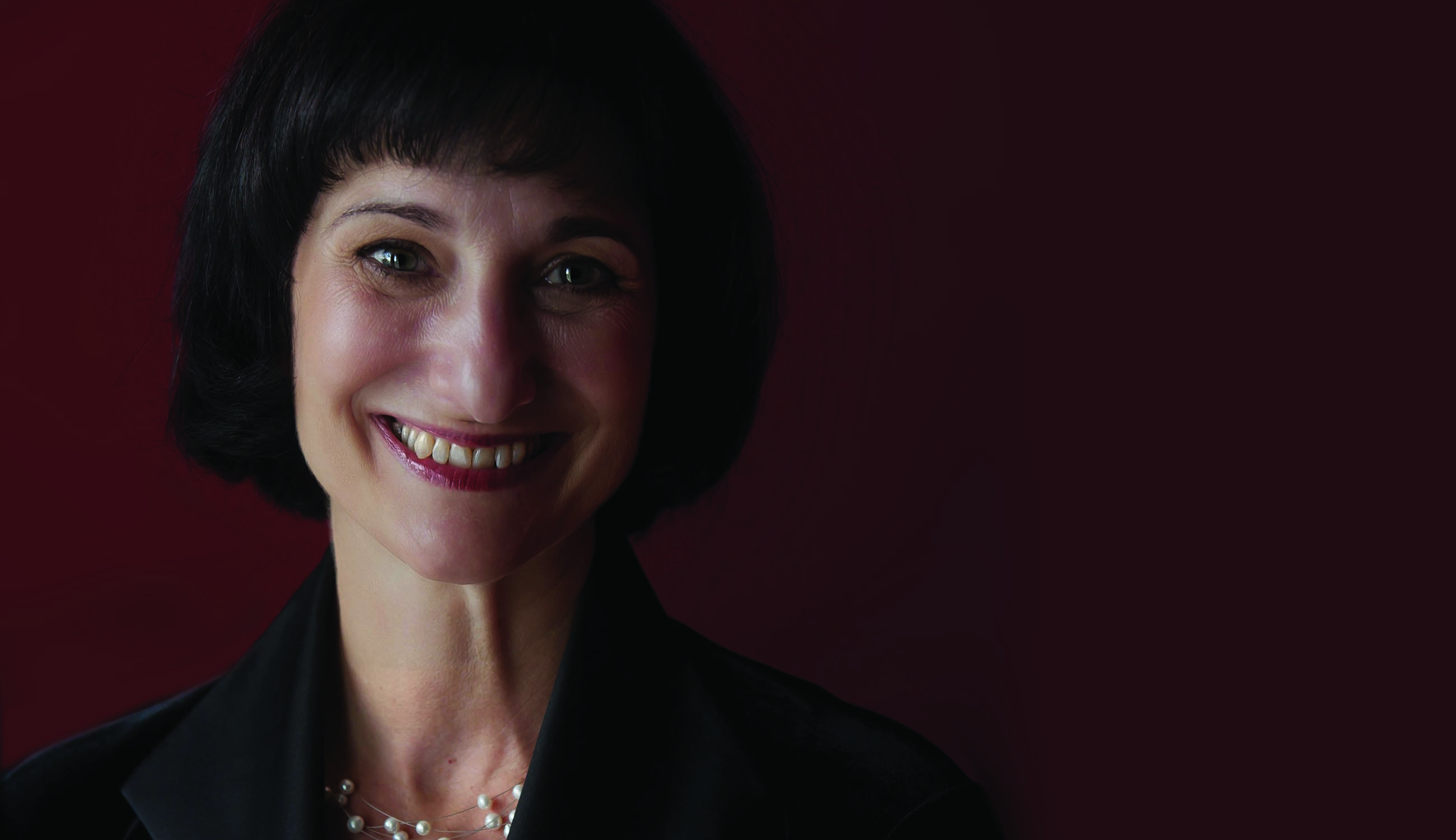First, But Not Last: Jessica Rosenworcel ’93 and Lael Brainard ’83

Jessica Rosenworcel ’93 and Lael Brainard ’83 reflect on making a seat at the table for women in top U.S. government decision-making positions and the continuing work of broadening access and inclusivity for all
In 1983, as Lael Brainard was graduating with honors from Wesleyan University majoring in the College of Social Studies, leadership across the United States government still carried the air of an old boys’ club. Only a handful of women had ever held a Cabinet-level position, just two percent of the U.S. Senate were women, and as still remains the case, the president had always been a man. Not until Kamala Harris’s historic 2021 swearing-in ceremony was the highest Cabinet position, vice president, ever occupied by a woman.
Brainard is now in rarified air of her own as vice chair of the Board of Governors of the Federal Reserve System. Brainard is only the third woman to hold the position, following in the most recent footsteps of now Secretary of the Treasury Janet Yellen.

“It took 65 years for the first woman to be appointed to the Board of Governors [of the Federal Reserve System], nearly 70 years for the first woman to be selected as the president of a Reserve Bank, and over 100 years for the first woman to be appointed as chair . . . and it was not until this year that the first Black woman was selected as the president of the Reserve Bank and nominated as a member of the Board of Governors,” said Brainard. “Changing decision-making power does not happen by chance. It requires determined leadership, intentional institutional commitment, and consistent effort over many years to bring about lasting change. I hope we will continue to make progress as we move beyond firsts to many.”
A decade after Brainard left Wesleyan, a major shift was seriously underway in the balance of power between men and women across the federal government. The year Jessica Rosenworcel ’93 graduated from Wesleyan as a double major in economics and English, Janet Reno became the country’s first attorney general. While at Wesleyan, Rosenworcel would witness what became known as the “Year of the Woman,” with a record 47 women elected to the U.S. House of Representatives and the likes of Barbara Boxer and Dianne Feinstein joining the U.S. Senate.

Today, Rosenworcel is the first woman in the Federal Communications Commission’s 87-year history to be named as permanent chair. “In so many institutions, those in leadership do not look like the country. I’m mindful of that every day in my current role,” she said. “You don’t forget that you’re different than those who came before you. You also know that while you may be the first, you can’t be the last.”
Both Brainard and Rosenworcel recently spoke with Wesleyan University Magazine about their roles in the U.S. government, related how liberal arts at Wesleyan University led to somewhat unexpected career paths, and reflected on the continued inequality in leadership inside and outside of Washington, D.C. The following are edited excerpts from their conversations.
On Imagining a Career in Government
Brainard: I grew up in Germany and Poland during a time of communism, so I was naturally fascinated by the stark differences in political and economic freedoms and opportunities that I saw. After graduating from Wesleyan, my work took me to a variety of different countries to work on interesting economic challenges.
Rosenworcel: I’m an impatient optimist and believe that serving in government—even with its challenges—is an incredible opportunity to do good at scale. But I can’t say that I always imagined myself in this position. Certainly not when I was in college! Still, there are elements of my time in Middletown that inform my work to this day—a sense of curiosity, a willingness to spend time with technical details, and a belief that change is possible and worth the effort.
Brainard: Looking back, I have always been motivated by lifting up the lives and livelihoods of middle- and lower-income families. If my younger self had understood the mission of the Federal Reserve and how it touches the lives of so many Americans, this is the career I would have “always imagined.”
On Experiencing the Pressures of Gender Disparity
Rosenworcel: Look, I know what it’s like to be the only [woman] in a room when a decision is being made. I know what it’s like not to be invited to a discussion. So, I have always taken a cue from Shirley Chisholm, who said, “If they don’t give you a seat at the table, bring a folding chair.” If you want to get things done, those are words to live by.
Brainard: It is often challenging when women seek to make their voices heard in policymaking deliberations because of implicit bias. The challenge is undoubtedly greater for women of color. That said, I am optimistic that we will continue to see progress on addressing implicit bias on gender and race in perceived authority, but it will require persistent effort.
On Recalling Trailblazing Lessons Learned at Wesleyan
Rosenworcel: I studied both economics and English. In some ways, they point in different directions. I was drawn to both, and Wesleyan was a place where that was just fine. I still think about economics with network deployment and the distribution of scarce resources. I also still think about the power of narratives to shape and explain the [Federal Communication Commission’s] most technical work. There are themes from my undergraduate days that inform the work I’m doing now.
Brainard: When I turned in serious work and made serious reflections on the material, my professors evaluated my ideas and, over time, took my potential as a scholar and practitioner seriously. In turn, that gave me confidence to try to make a contribution.
On Making an Impact through Government Service
Brainard: Right now, the most important part of my work is to bring inflation down while sustaining a recovery that includes everyone. The work we do touches the lives of every American family—achieving price stability and full employment, helping to ensure the stability and resilience of the financial and payments system, and supporting investment in low- and moderate-income communities around the country.
Rosenworcel: Coming out of the pandemic, it has never been clearer that we need to connect everyone, everywhere with affordable high-speed broadband. That’s an infrastructure task of historic proportion—on par with the development of the interstate highway system back in 1956. Access is now essential for every person, every household, and every business in order to have a fair shot at 21st-century success.
On Advice for the Next Generation of Barrier-Breaking Women
Rosenworcel: Remember, it’s not only about you. It’s about those who come behind you. So be a sponsor, be a mentor, be someone who brings someone else along. It’s how we’ll multiply our numbers and change what leadership looks like.
Brainard: Learn from setbacks, stay focused on the mission, and never give up.



